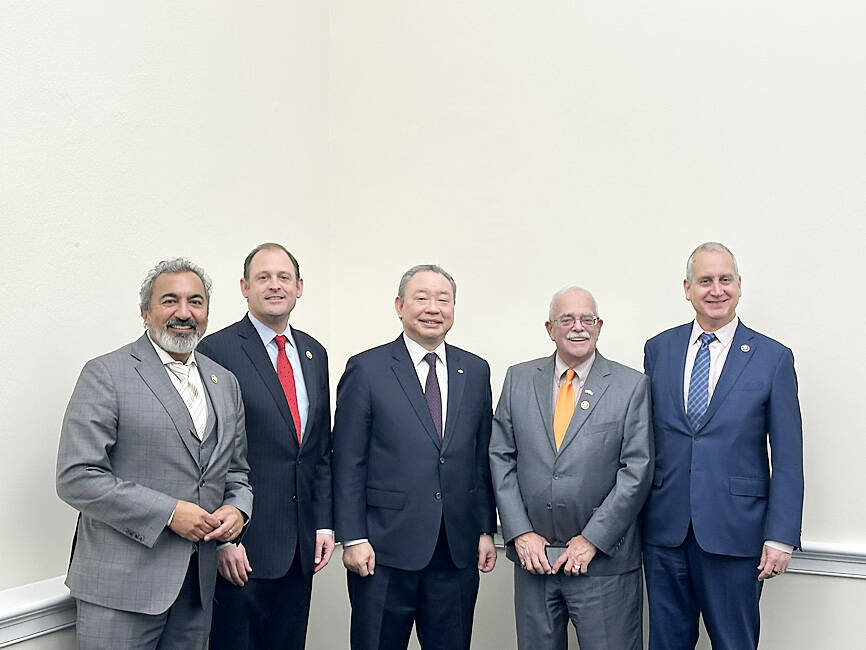Members of the US House of Representatives’ Congressional Taiwan Caucus on Friday issued a bilateral statement condemning China’s 22 guidelines targeting Taiwanese as an act that severely threatens regional stability and peace.
Congressional Taiwan Caucus cochairs Ami Bera, Gerald Connolly, Andy Barr and Mario Diaz-Balart said in a statement that “this escalatory move by Beijing represents a significant threat to peace and stability in the region.”
The guidelines would “have a severe chilling effect on exchanges with China” and represent “a destabilizing policy approach to cross-strait relations,” they said.

Photo: screen grab from Mario Diaz-Balart’s X account
“The Congressional Taiwan Caucus will continue to stand with our key democratic partner, Taiwan, as it faces an increasingly belligerent and dangerous” People’s Republic of China, the statement said.
Late last month, China issued the 22-point set of “guidelines” to penalize “die-hard” Taiwanese independence separatists, including with the death penalty.
US Assistant Secretary of State for East Asian and Pacific Affairs Daniel Kritenbrink had said during a congressional testimony session on June 27 that Beijing was pushing for extraterritorial jurisdiction in a “worrisome way” that would create a chilling effect on cross-strait dialogue and interaction.
That same day, the Mainland Affairs Council issued a travel advisory that upgraded the warning for travel to China, Hong Kong and Macau to orange from yellow, and urged Taiwanese to refrain from traveling there unless absolutely necessary.
Separately, China’s Taiwan Affairs Office on Friday said that four types of actions could be considered separatist crimes.
First, starting or establishing a pro-Taiwanese independence organization to plan and engage in plans to “split” the country and damage ‘national unity,” it said.
Second, drafting or amending legislation to clarify or annul regulations or referendum voting methods regarding the “Taiwan area” to undermine the legality of Taiwan being part of China.
Third, campaigning for Taiwan to join international bodies limited to the participation of sovereign states, or making contact with other countries, diplomatically or militarily, to create the semblance of “two Chinas,” “one China, one Taiwan” or an “independent Taiwan.”
Last, a person using their position to alter the “fact” that “Taiwan is a part of China” through cultural or historical education, or through news and media, or acts of oppressing parties, groups and individuals supporting the peaceful development and unification of China and Taiwan, the office said.

SECURITY: As China is ‘reshaping’ Hong Kong’s population, Taiwan must raise the eligibility threshold for applications from Hong Kongers, Chiu Chui-cheng said When Hong Kong and Macau citizens apply for residency in Taiwan, it would be under a new category that includes a “national security observation period,” Mainland Affairs Council (MAC) Minister Chiu Chui-cheng (邱垂正) said yesterday. President William Lai (賴清德) on March 13 announced 17 strategies to counter China’s aggression toward Taiwan, including incorporating national security considerations into the review process for residency applications from Hong Kong and Macau citizens. The situation in Hong Kong is constantly changing, Chiu said to media yesterday on the sidelines of the Taipei Technology Run hosted by the Taipei Neihu Technology Park Development Association. With

A US Marine Corps regiment equipped with Naval Strike Missiles (NSM) is set to participate in the upcoming Balikatan 25 exercise in the Luzon Strait, marking the system’s first-ever deployment in the Philippines. US and Philippine officials have separately confirmed that the Navy Marine Expeditionary Ship Interdiction System (NMESIS) — the mobile launch platform for the Naval Strike Missile — would take part in the joint exercise. The missiles are being deployed to “a strategic first island chain chokepoint” in the waters between Taiwan proper and the Philippines, US-based Naval News reported. “The Luzon Strait and Bashi Channel represent a critical access

‘FORM OF PROTEST’: The German Institute Taipei said it was ‘shocked’ to see Nazi symbolism used in connection with political aims as it condemned the incident Sung Chien-liang (宋建樑), who led efforts to recall Democratic Progressive Party (DPP) Legislator Lee Kun-cheng (李坤城), was released on bail of NT$80,000 yesterday amid an outcry over a Nazi armband he wore to questioning the night before. Sung arrived at the New Taipei City District Prosecutors’ Office for questioning in a recall petition forgery case on Tuesday night wearing a red armband bearing a swastika, carrying a copy of Adolf Hitler’s Mein Kampf and giving a Nazi salute. Sung left the building at 1:15am without the armband and apparently covering the book with a coat. This is a serious international scandal and Chinese

COUNTERINTELLIGENCE TRAINING: The ministry said 87.5 percent of the apprehended Chinese agents were reported by service members they tried to lure into becoming spies Taiwanese organized crime, illegal money lenders, temples and civic groups are complicit in Beijing’s infiltration of the armed forces, the Ministry of National Defense (MND) said in a report yesterday. Retired service members who had been turned to Beijing’s cause mainly relied on those channels to infiltrate the Taiwanese military, according to the report to be submitted to lawmakers ahead of tomorrow’s hearing on Chinese espionage in the military. Chinese intelligence typically used blackmail, Internet-based communications, bribery or debts to loan sharks to leverage active service personnel to do its bidding, it said. China’s main goals are to collect intelligence, and develop a